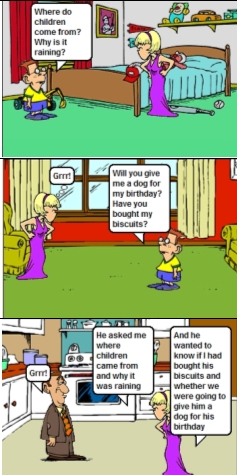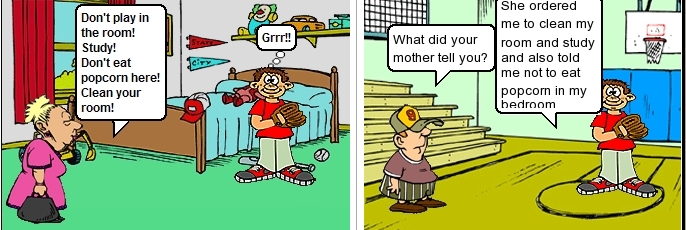 Walking towards the end of the course we tend to feel rather stressed and pressed for time and I’m not the exception. But I don’t really believe that an awful amount of time will be saved by not introducing new grammatical points in a nice way.
Walking towards the end of the course we tend to feel rather stressed and pressed for time and I’m not the exception. But I don’t really believe that an awful amount of time will be saved by not introducing new grammatical points in a nice way.
This is how I introduced Reported Speech Questions and Orders. This time it was the traditional way of teaching, ie, chalk and blackboard and I’m not good at drawing so needless to say, my students had to use their imagination to guess that I was drawing a little girl and her mother.
The truth is I did little more than guiding them. My students named the characters and provided the questions. I only had to set the atmosphere -which was a four-year-old girl pestering her mother all day long with questions -and from there, we had the husband coming back home and her mother complaining about their talkative daughter.
Grammar here, Exercises here ,here and here
Realizing they were learning and “sort of” enjoying themselves I continued with the story and went on to teach Orders and Requests in reported Speech, the girl being 15 years old in this context and, as it’s usually the case, the mother now pestering the girl to do things (I’ve got a 15-year-old son, as you have probably guessed)
 Grammar here . Exercises here.
Grammar here . Exercises here.
And now that we are on the subject, why not continue with the story and use it to introduce suggestions in reported speech?

 are crazy to learn and frustrating to teach, iiiif they can be taught !
are crazy to learn and frustrating to teach, iiiif they can be taught ! Walking towards the end of the course we tend to feel rather stressed and pressed for time and I’m not the exception. But I don’t really believe that an awful amount of time will be saved by not introducing new grammatical points in a nice way.
Walking towards the end of the course we tend to feel rather stressed and pressed for time and I’m not the exception. But I don’t really believe that an awful amount of time will be saved by not introducing new grammatical points in a nice way. Grammar
Grammar